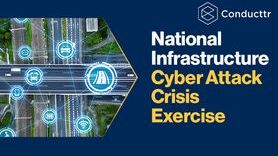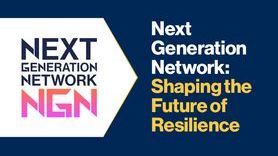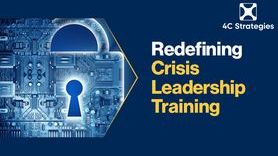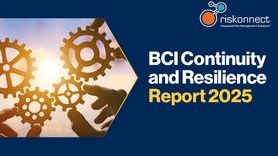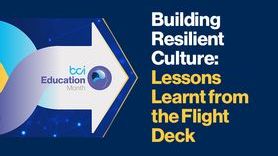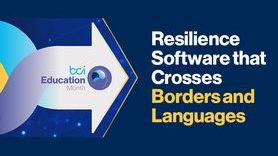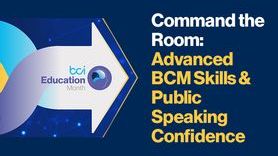Business Continuity in Southern Africa: When Exception is Rule - The Case of Mozambique
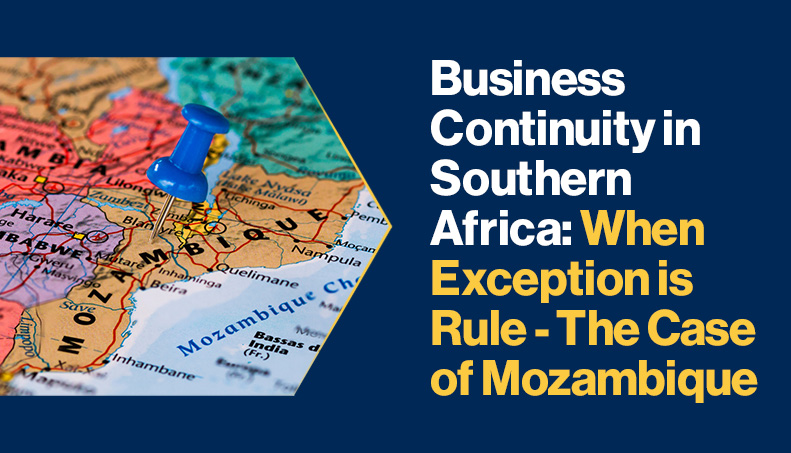
Foreword: This article, written by Eusébio Sanjane, AMBCI, examines the challenges to resilience and business continuity in Mozambique and suggests how practitioners can develop adaptive strategies to enhance long-term resilience in a continually unstable region.
Southern Africa presents a paradox in the context of business continuity management. Why? Because how can you implement systems designed to manage exceptional events in a region where instability is structural?
While global organizations treat pandemics, natural disasters, and conflicts as temporary deviations from normality, Southern African businesses operate in a challenging environment marked by cyclical droughts, political instability, and ongoing armed conflicts.
Mozambique, my country, with its 30 million inhabitants and a growing but vulnerable economy, illustrates this challenge.
The country deals with multiple crises at the same time, for example, insurgency in the north, devastating cyclones, post-election tensions, and unreliable infrastructure. Then, in 2024, the general elections brought a new dimension to this complexity. Protests led by the opposition leader Venâncio Mondlane resulted in many deaths and injuries, forcing the government to interrupt communications to control social networks. I believe this measure worsened the economic paralysis it intended to prevent.
The Mozambican case: Anatomy of a systemic crisis
Mozambique is subject to numerous risks and threats on an ongoing basis. These include climate challenges, fragile governance, and armed conflicts:
Climate And Food Insecurity
The region faces a predictable but devastating cycle of droughts and floods. Mozambique, Zimbabwe, and Malawi regularly experience food crises that are not merely humanitarian emergencies, but systemic shocks that paralyse supply chains, reduce purchasing power, and force mass migrations. A company operating in this context cannot treat drought or flood as an ‘interruption’ - it must integrate it into its permanent operational strategy.
Fragile Governance And Regulatory Unpredictability
Political instability does not manifest only in coups d'état or civil wars. It expresses itself in regulatory unpredictability, systemic corruption, and erosion of the rule of law.
How can an organization establish continuity protocols when the rules of the game constantly change? Zimbabwe's experience, where sudden political changes destroyed entire economic sectors, illustrates how fragile governance renders any traditional continuity planning irrelevant.
Armed Conflicts And Population Displacement
Mozambique faces an insurgency in the north that has already displaced hundreds of thousands of people and paralysed the natural gas industry. The Democratic Republic of Congo (DRC) experiences permanent conflicts that transform entire territories into economic exclusion zones. These are not ‘risks’ to be mitigated, they are operational realities that require adaptive business models.
The 2024 Elections: When Democracy Paralyses The Economy
The 2024 Mozambican general elections illustrated how political events can transcend the government and become business catastrophes. The post-electoral protests, which extended for months, were not merely manifestations of political discontent, they were systemic shocks that tested the resilience of the entire national economy.
The blockade of National Road No. 1, the main artery connecting the country's south to north, was not just a logistical interruption, it was economic strangulation that separated markets, isolated communities, and fragmented value chains. Commercial establishments were looted and vandalised as an extension of the political crisis that manifested in economic violence.
The government’s response of interrupting mobile communications and internet exemplifies the fundamental dilemma of business continuity and fragile governance. The measure, which was intended to control information on social networks, created an information blackout that prevented not only protest coordination, but also banking system operations, business communication, and logistical coordination.
It is difficult to describe the full extent of the chaos at that time, but it was deeply unsettling and, in my experience, without precedent.
Multiple Impacts On Business Continuity
Mozambique's post-electoral crisis highlighted how political instability can simultaneously affect various operational areas. Here are some of the ways in which it impacted continuity:
Logistical Paralysis
The difficulty of goods and people circulation created artificial scarcity of basic products, localised inflation, and created supply chain disruption. Companies dependent on just-in-time inventory suddenly found themselves without raw materials or finished products.
Workforce Fragmentation
Restricted mobility prevented labour circulation. Skilled and vital workers were isolated in their homes and companies faced massive absences without alternatives.
Communication Collapse
Communication interruptions affected not only protests, but they also temporarily destroyed the digital infrastructure upon which the modern economy rests. Logistical co-ordination and business communication were severely compromised.
Adaptive Solutions: Lessons From The Field
Some Mozambican institutions developed innovative approaches to maintain essential operations during the electoral disturbances, such as:
Accommodation Strategies And Crisis Teams
Accommodating crisis technical teams in hotels near headquarters allowed continuity of critical processes, however this approach also revealed significant limitations. These included:
- Complex logistics, as the need for last-minute reservations in hotels with limited capacity created unexpected operational challenges.
- Limited sustainability: The impossibility of predicting check-in/check-out affected both hotel management and workers' personal lives.
- Dependence on external infrastructure: Hotel service quality deteriorated due to road impassability, affecting the crisis team.
Remote Work In Fragile InfrastructureContext
The massive adoption of remote work during the electoral crisis revealed both its potential and the current structural limitations.
Remote working meant there was significant reduction in risk exposure for workers residing in areas with high incidents of violence, which maintained critical operations, but the structural limitations of internet instability and connectivity problems compromised operational efficiency. Dependence on physical processes revealed the inadequacy of traditional workflows for crisis contexts.
Institutional communication in real time
Using flexible communication channels, like unofficial WhatsApp messages, showed the need for more adaptable communication. However, delayed communication about critical guidelines such as remote work activation and specific schedules exposed workers to unnecessary risks. For example, some employees continued commuting to the workplace even after in-person activities had been suspended, simply because they were not informed in time.
Flexible human resource management
Temporary schedule adjustments and selective dismissal of non-essential workers reduced risk exposure but revealed gaps in planning for prolonged situations. The forced permanence of workers in hotels for days illustrates the complexity of managing human resources during prolonged instability.
The need to rethink conventional models
International BCM standards (ISO 22301, for example) were designed for contexts where infrastructure functions, institutions are relatively stable, and the rule of law prevails. Applying these frameworks in Southern Africa is like using a maritime navigation manual to cross a desert – it is conceptually related, but operationally useless.
Consider the concept of ‘Recovery Time Objective’ (RTO). In a developed economy, a company can reasonably expect to restore operations within 24-72 hours after an interruption. In Southern Africa, where a drought can last years, where conflicts drag on for decades, and where infrastructure reconstruction can take generations, RTO becomes an abstraction without practical meaning.
Future needs: Making business continuity more adaptive
Southern Africa requires a radically different approach to resilience. Agile Business Continuity Management (ABCM) recognises that continuity does not mean maintaining unchanged operations but rather maintaining relevance and sustainability in an environment of constant change.
ABCM principles in a Mozambican context
Agile business continuity management is essential for organizations to thrive in unpredictable environments such as Mozambique.
In a context marked by structural instability, recurring crises, and rapid environmental changes, traditional business continuity approaches often prove inadequate. ABCM involves several key concepts that ensure resilience and adaptability, including proactive risk assessment, flexible response strategies, continuous improvement, and stakeholder engagement. By integrating the following principles, Southern African organizations can more effectively mitigate disruptions while maintaining operational relevance in constantly evolving scenarios.
Cross functional crisis teams:
Permanent, multidisciplinary teams that can rapidly reorganise and respond to different types of disruptions, embodying the agile principle of self-organising teams.
Continuous iteration:
Regular review and adaptation of continuity plans based on real-world feedback and changing conditions, following the agile principle of embracing change over following a plan.
Minimum viable operations (MVO):
Identifying the smallest set of operations that can maintain business value during disruptions, allowing for rapid deployment and iterative enhancement.
Stakeholder collaboration:
Continuous engagement with communities, suppliers, and partners to build organic resilience, reflecting the agile value of collaboration over contract negotiation.
Working solutions over comprehensive documentation:
Prioritising functional, flexible responses over extensive planning documentation that may become obsolete quickly.
Practical recommendations for the Mozambican context
Given Mozambique's unique operational challenges, practitioners should focus on three critical areas to build organizational resilience. Technology investment must prioritise redundancy and independence from single-point failures, while human resource management requires permanent crisis capabilities rather than ad-hoc responses. Additionally, institutional communication systems must be designed to function effectively even when conventional infrastructure fails.
These strategic interventions can significantly improve an organization's ability to maintain operations during disruptions.
Resilient technological infrastructure
The 2024 elections experience demonstrated that excessive dependence on a single communication infrastructure constitutes a critical vulnerability.
To address this, organizations must invest in redundant connectivity, the practice of creating multiple pathways for network traffic to ensure continuous operation even if one path fails, by using multiple internet providers, including satellite-based solutions. They should also implement offline systems to ensure they can carry out critical operations without relying on external connectivity.
Additionally, achieving complete digitisation is essential, including eliminating processes that still require physical signatures.
Human resource management in crisis
Permanent crisis teams should be established not only for specific events but as a lasting part of the organizational structure.
Additionally, strategic accommodation plans need to be in place through pre-established agreements with multiple lodging options. Regular crisis management training for staff is also essential to prepare for a wide range of scenarios.
Effective institutional communication
Multi-channel protocols involve the simultaneous use of multiple communication channels to ensure message delivery, and automated alerts, utilising mass notification systems that operate independently of conventional infrastructure.
Additionally, establishing authority delegation produces clear mechanisms for decision-making during communication interruptions.
Conclusion: Rethinking Continuity
Southern Africa does not need diluted versions of BCM systems developed for other realities. It needs agile frameworks that recognise its unique complexity and transform its structural challenges into competitive advantages.
Mozambican organizations that managed to maintain critical operations during the 2024 post-electoral disturbances did not do so by applying international manuals, but by developing agile solutions that recognised local reality and embraced rapid adaptation.
The Mozambican case demonstrates that business continuity in contexts of structural instability is not about ‘returning to normal’, it is about operating effectively through continuous adaptation in an environment where change is the only constant. Organizations that can operate effectively in this environment will develop agile resilience capabilities.
The experience of Mozambique's 2024 elections with its many deaths, logistical paralysis, and communication blackouts was not a one off. It was a preview of the complexities that global organizations may increasingly face as geopolitics become more unstable. The agile solutions developed in the Mozambican field, from cross-functional crisis teams to adaptable communication protocols, represent innovation in business continuity that can help inform global practices.
Mozambique, with its recurrent crises and creative solutions, offers a unique case study on how to transform instability into business resilience through agile business continuity management. The future of business continuity may be learned in the savannas and cities of Southern Africa, where agile adaptation is not a desirable competence, but a matter of organizational survival
Disclaimer: The views and opinions expressed in this work are those of the author and do not necessarily reflect the official policy or position of any institution with which the author is affiliated.
This content was translated with AI assistance to preserve the accuracy of the original text.





